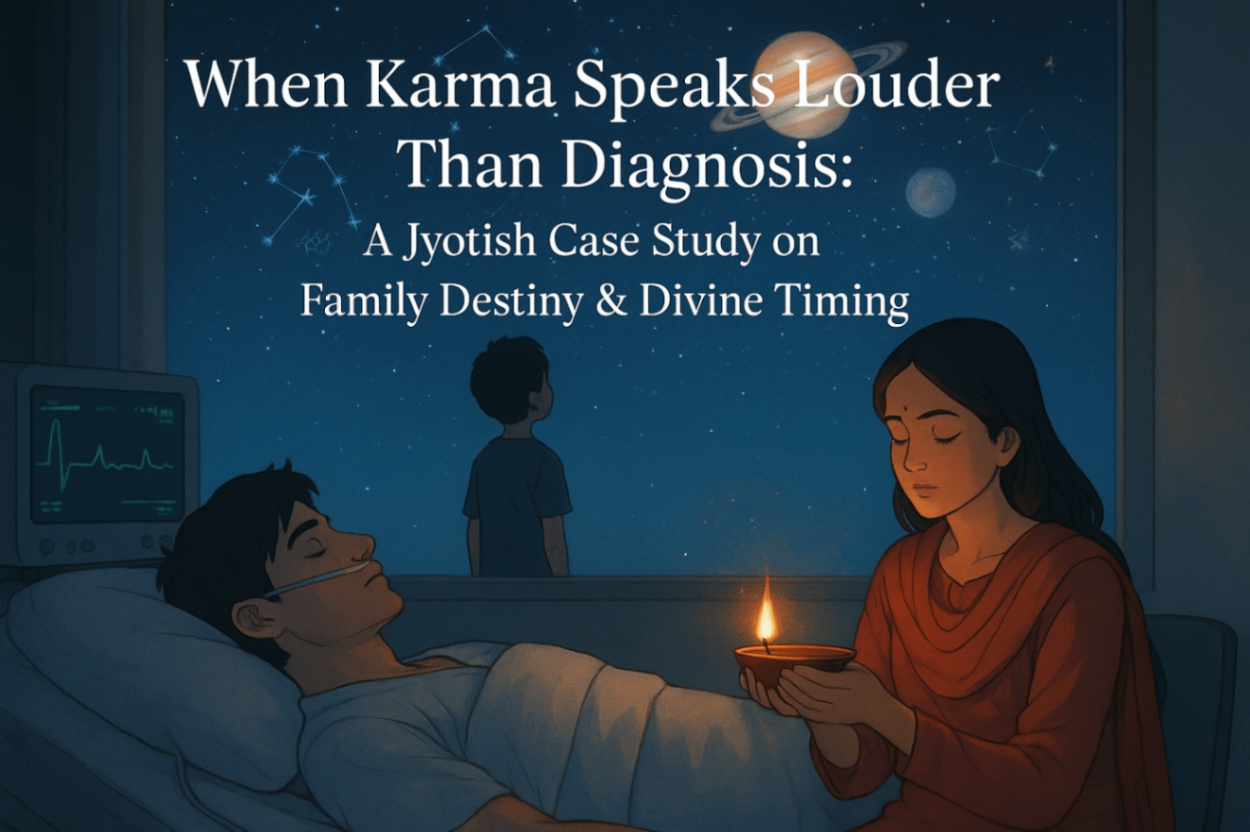The search for well-being is a universal pursuit. Across many cultures, people have explored diverse methods for staying healthy and happy. In the Vedic tradition, there is an ancient branch of knowledge known as Medical Astrology. This approach looks at the positions of planets and the movement of celestial bodies to analyze physical, mental, and emotional health. By blending cosmic insights with practical advice, it aims to support individuals on their journey toward balance. Though modern healthcare focuses on science-based treatments, many feel a deeper connection when they also consider the guiding principles of Vedic teachings.
Origins of Medical Astrology in Vedic Thought
Vedic wisdom is vast, offering spiritual teachings, guidance on ethical living, and approaches to health. One important question often asked by seekers is what is medical astrology in ancient india. In this context, Medical Astrology is seen as the study of how the planetary patterns in one’s birth chart can influence well-being. Ancient seers believed everything in the universe is interrelated. This means that each planet holds a unique energy, and these energies can reflect various physical or psychological states.
In classical times, healers would look at a person’s natal chart to spot possible vulnerabilities. They focused on planetary positions, aspects, and houses that could indicate problem areas in the body. This analysis was never meant to replace medical treatments. Rather, it helped guide people in making lifestyle choices that aligned with the cosmic influences of their birth.
Astrological Houses and Their Role in Health
In Medical Astrology, certain houses in the horoscope are traditionally linked to specific areas of the body. The sixth house is usually tied to health matters, diseases, and daily routines. By studying this house, astrologers may identify any risk factors or tendencies for chronic conditions. The eighth house can sometimes show sudden events, transformations, or surgeries, while the twelfth house might reveal hidden issues or subconscious stress.
This does not mean a challenging placement in these houses guarantees poor health. Instead, it serves as a subtle warning system. It encourages proactive measures, such as adjusting one’s diet or seeking medical check-ups. This is where astrology health predictions can be helpful. They steer individuals toward careful planning, balanced nutrition, and preventive care. Whether it is the sixth house or another part of the chart, the emphasis is on self-awareness and responsibility.
Influence of Medical Astrology Planets
When we talk about medical astrology planets, Saturn, Mars, Rahu, and Ketu often attract attention for their perceived capacity to bring hurdles or imbalances. Saturn’s slow and steady energy might hint at chronic or long-term conditions. Mars, known for passion and drive, may indicate acute inflammation or accidents if placed in a sensitive spot. Rahu and Ketu, the lunar nodes, are sometimes associated with sudden events or unusual illnesses.
However, not all planetary influences are negative. Benefic planets like Jupiter and Venus may offer protection, healing, or resilience. Jupiter is sometimes linked with liver function and expansive growth, while Venus can be associated with reproductive health. Practitioners of Medical Astrology do not rely solely on negative factors. They also look for helpful influences that can indicate strong immunity, rapid recovery, or a positive mindset. These insights are most beneficial when paired with sensible medical advice, regular exercise, and a balanced lifestyle.
Astrology Health Predictions in Daily Life
In many parts of the modern world, there is renewed interest in holistic approaches that blend science, spirituality, and tradition. For some, turning to astrology health predictions can inspire confidence about making necessary changes. By observing planetary transits, a Vedic practitioner might advise more rest during certain periods, or caution against stressful schedules when specific transits occur. They may suggest increasing physical activity or adjusting food habits when the chart shows vulnerabilities in digestion or metabolism.
At the same time, astrology should not be used as an excuse to ignore professional medical care. If someone experiences persistent symptoms, it is crucial to consult a healthcare provider. Medical Astrology can serve as an added layer of insight, a supportive measure that complements modern treatments. For instance, if the chart indicates a strong Saturn period, an individual might pay closer attention to bone and joint health. This could involve practicing safe physical exercises or maintaining adequate levels of calcium and vitamin D.
Yogic Practices and Cosmic Balance
Many Vedic traditions encourage combining astrology with spiritual practices like yoga. Although yoga is often viewed through a fitness lens today, its roots extend deep into spiritual discipline and holistic well-being. Practices such as Kapal Bhati, a dynamic breathing exercise, can help clear the mind and invigorate the body when done correctly. However, overdoing it or performing it without proper guidance can strain the respiratory system.
This highlights the Vedic principle that moderation is essential. Just as planetary energies can reveal potential health risks or strengths, yogic exercises must be applied skillfully. Consulting trained teachers ensures that breathing techniques, asanas, and meditation are done with precision. Aligning these practices with one’s astrological chart can create an even more tailored approach to health. The aim is not extreme effort but balanced effort, guided by cosmic wisdom and personal awareness.
What Is Medical Astrology in Ancient India: A Deeper Look
The question of what is medical astrology in ancient india often arises when people study historical Vedic texts. References can be found in classical works discussing how each planet rules certain organs or physiological functions. For example, Mars might be associated with blood, Mercury with the nervous system, and Jupiter with the liver. Though these associations are symbolic, they reflect a worldview that sees the human body as a microcosm of the larger cosmos.
In ancient times, studying planetary patterns served as a form of early detection. If the birth chart hinted at a higher risk for liver issues, one might focus on dietary guidelines, herbal supplements, or physical exercises that support liver health. This approach remains relevant for those who view life as a tapestry, where subtle energies and physical reality interweave. Vedic thought invites individuals to remain watchful, appreciate the nuances of nature, and intervene before problems escalate.
Practical Applications and Lifestyle Adjustments
Living in harmony with cosmic rhythms might sound lofty, but it often involves simple day-to-day routines. Rising at sunrise can help regulate natural biorhythms. Sitting for a short meditation before bed can encourage mental calm. Depending on an individual’s chart, an astrologer might suggest reducing spicy foods if Mars is overly strong or adding soothing herbs if Saturn is prominent. These suggestions stem from the idea that small yet consistent lifestyle changes can have significant long-term benefits.
Another practical step is learning which planetary energies are active in one’s life at any moment. Vedic astrology uses a system known as dasha-bhukti, which outlines planetary periods and sub-periods. By understanding these patterns, people may choose to schedule major health procedures, initiate new therapies, or adopt new wellness habits at more favorable times. Again, this is complementary, not a replacement for medical expertise.
Respecting Modern Medicine While Embracing Tradition
In any conversation about Medical Astrology, it is essential to balance respect for ancient wisdom with the benefits of modern healthcare. Scientific advances have brought us diagnostic tools, surgical procedures, and medications that save countless lives. Vedic practitioners generally acknowledge that these developments are indispensable. They view Medical Astrology not as a separate solution but as a guiding framework that enriches an individual’s health journey.
Seeing a doctor for check-ups, lab tests, and expert medical opinions is a must for serious conditions. By also exploring astrological insights, one can adopt a broader perspective. The cosmic lens can shed light on potential problem areas and emotional patterns that may contribute to illness. Combining medical advice with gentle life adjustments is a core principle in holistic healing. This synergy between modern and ancient modes of understanding can offer a unique path forward for those seeking an integrated approach.
Mental and Emotional Well-Being in Vedic Traditions
In Vedic philosophy, the mind and emotions greatly influence physical health. Stress, anxiety, or negative thinking can exacerbate underlying imbalances indicated in the birth chart. A chart that shows tension between Mars and the Moon might reflect emotional volatility, which could lead to stress-related health issues. Recognizing this pattern prompts a focus on emotional regulation, perhaps through mindfulness, therapeutic counseling, or gentle yoga routines.
When emotional well-being improves, the body often follows suit. Meditation or spiritual practices like mantra chanting can offer profound relaxation. Positive states of mind are believed to counteract harmful planetary influences. Even if you do not fully accept the notion of celestial energies, the practical reality is that stress relief, controlled breathing, and healthy living will likely benefit anyone. From the Vedic standpoint, these practices align you with a more harmonious cosmic flow.
Evolving Perspectives in Modern Times
The global resurgence of interest in yoga and holistic health has reignited curiosity about Medical Astrology. People are once again asking astrology health predictions for guidance and reassurance. Some are rediscovering the classical teachings, while others are blending them with new research. Technology, too, has made astrological calculations more accessible. Whether you consult computer software or experienced Vedic scholars, you can gain more precise insights than ever before.
Critics argue that astrological beliefs are not scientifically proven, pointing out that evidence-based medicine rests on verifiable data. Yet supporters respond by saying Medical Astrology operates on a different paradigm that focuses on subtle energies and personal introspection. They emphasize it is not about denying modern science, but rather adding another dimension to the conversation on wellness. The debate may continue, but many find value in a system that promotes mindfulness, self-inquiry, and personal responsibility for health.
Conclusion: Merging Ancient Wisdom and Present-Day Healthcare
Ultimately, Medical Astrology is a reminder that health is multifaceted. Humans are physical, mental, and spiritual beings. Each dimension requires attention and care. If looked at through the lens of Vedic wisdom, even everyday ailments can be messages that prompt greater self-awareness. By combining planetary insights with regular medical guidance, yoga practice, and mindful habits, you can cultivate a lifestyle that respects both cosmic and earthly realms.
Modern science has revolutionized how we treat diseases, yet age-old traditions still hold lessons about prevention, balance, and harmony. When used wisely, medical astrology planets and techniques from the Vedic tradition can point individuals toward actions that support longevity and vitality. Whether you seek to try new breathing exercises, make dietary adjustments, or explore the symbolic meanings of your birth chart, the goal remains the same: nurturing a healthier, happier life.
This union of ancient and modern demonstrates that wisdom can come from many sources. The cosmos continues its timeless dance, and we, as part of this grand design, can tune into its rhythms. By listening closely, learning carefully, and acting thoughtfully, each of us can move toward a state of more complete well-being and spiritual alignment.
















